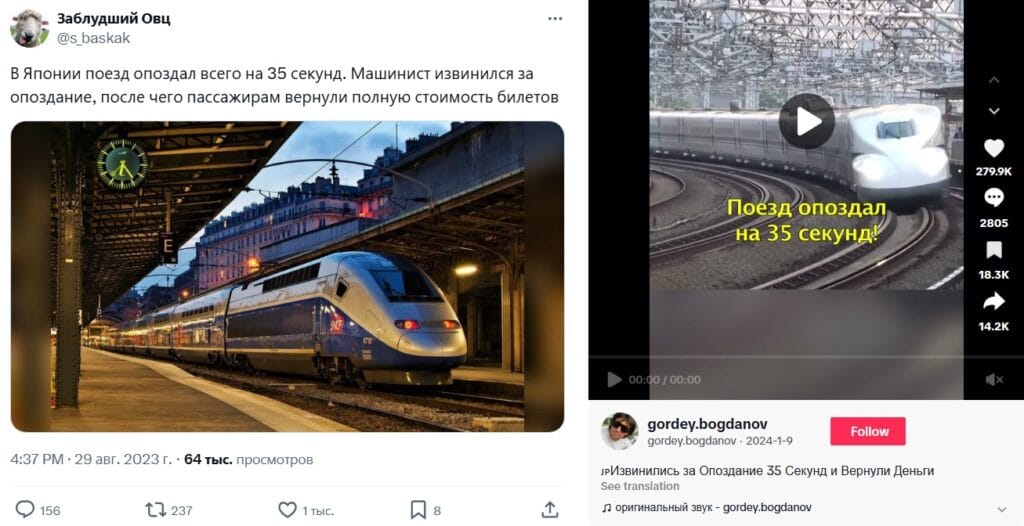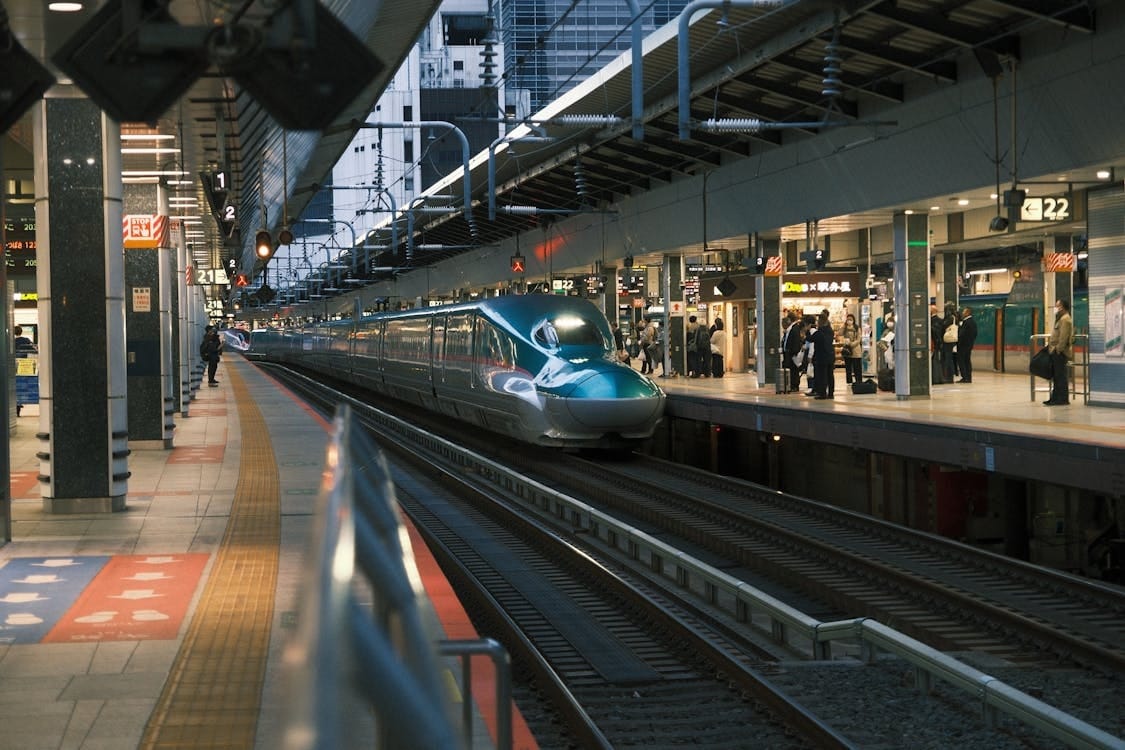There is a popular story on the Internet about Japanese railways: allegedly, after a slight delay in the flight, all passengers on the train were apologized and compensated for the full cost of the tickets. We checked its accuracy.
Such posts have been found on Runet for several years now: they were published both in 2021 year and in 2025. One of the expanded versions of the stories goes like this: “A train in Japan was 35 seconds late, and the driver apologized to each passenger. In addition, all passengers were given a full refund. Japan greatly values punctuality and respect. While delays are normal in many countries, in Japan even seconds matter.” In some entries also TBC, that we are talking about a network of high-speed railways "Shinkansen", connecting major cities of the country.
Russian-language posts on this topic were published on VKontakte (examples here And here), Telegram (here, here And here), Instagram* (here, here And here), Facebook*, X And "Peekaboo" On TikTok, where are the videos about this story? meet in different languages, one of several Russian-language videos gained more than 5 million views.

In Japan, which counts a model of punctuality, indeed were cases where railway companies apologized for delaying trains from schedule by just a few tens of seconds. For example, in November 2017, a train from Tokyo went to the city of Tsukuba for 20 seconds. earlier than planned. Then the management of the Metropolitan Intercity Railway stated, which sincerely apologizes to passengers for the inconvenience caused. According to the press release, the driver did not check the schedule, but the company did not receive any complaints regarding this incident. In May 2018 happened similar situation: West Japan Railway (JR West) asked for forgiveness for delaying its train for 25 seconds. ahead of schedule. From the official statements It follows that an investigation was carried out, according to which the driver made a mistake with the departure time and did not notice the people remaining on the platform. In both cases, no refund of money spent on tickets was reported.
There is a different story about train delays and monetary compensation. In 2021 in Japan, a machinist submitted suing his employer after he was fined for a short delay. It was reportedthat in June 2020, a man was supposed to pick up an empty train and take it to the depot, but mistakenly waited on another platform, causing a minute deviation from the schedule. As a result, the railway company JR West withheld 56 yen from the employee's salary ($0.49 at the exchange rate at the time news of the lawsuit appeared), and he, in turn, demanded 2.2 million yen (more than $19,000) as compensation for moral damages. According to the man, the delay did not actually disrupt the schedule and did not affect passengers, since the train was empty at the time of the incident.
As for the viral story about the train being late by 35 seconds, none of the publications found by “Verified” in different languages specified where and when this incident occurred. Neither we nor our colleagues from the fact-checking project Open, who checked similar posts in Italian, did not find notes about such an incident in reputable media, although other similar incidents described above were widely reported in the press. Doubts about the veracity of the story are also raised by the clarification that the driver personally asked for forgiveness from the passengers, whereas in the previously cited examples the company apologized through press releases.
Japan Railways (JR), which owns Shinkansen, is a group of companies serving different regions of Japan. It accounts for the largest share of intercity and suburban rail traffic. JR consists of six passenger companies, of which five currently operate Shinkansen lines: JR East, JR West, JR Central, JR Kyushu And JR Hokkaido. “Verified” studied their websites and found the rules for compensation in case of trains falling behind schedule: the full cost of tickets is refunded only when the express train is delayed for at least two hours, and for some types of tickets no refund is made. In addition, if the train is delayed for more than 5 minutes, passengers have the right get special certificate, which can be used as excuses of your tardiness.
However, such long delays are rare for Japanese railways. For example, according to available reports from JR Central, which operates "Tokaido Shinkansen", the average train on this busy line is 2018 financial year was late by 0.9 minutes, and in 2023-m - by 1.6 minutes. In 2024, the Financial Times reportedthat the average delay of a train on the same line is slightly less than 1 minute, and in 2016 it was only 24 seconds.
Thus, the viral story about a Japanese train being late by 35 seconds. with subsequent apologies from the driver and a full refund of money to passengers, is not confirmed in open sources. Although Japan's railway system is renowned for its punctuality, minor errors in train schedules still occur and transport companies sometimes even issue public apologies to passengers. However, Japan Railways group policy is to provide compensation only for delays of two hours or more.
*Russian authorities think Meta Platforms Inc., which owns the social networks Instagram and Facebook, is an extremist organization; its activities and symbols are prohibited in Russia.
Cover photo: Zain Abba / Pexels
- Is it true that the Tokyo subway launched a train in the shape of Kotobus from the anime “My Neighbor Totoro”?
- Is it true that the subway in Japan put up such posters against the inappropriate behavior of black passengers?
- Is it true that in Japan a teacher was fired for working part-time in a store?
If you find a spelling or grammatical error, please let us know by highlighting the error text and clicking Ctrl+Enter.






